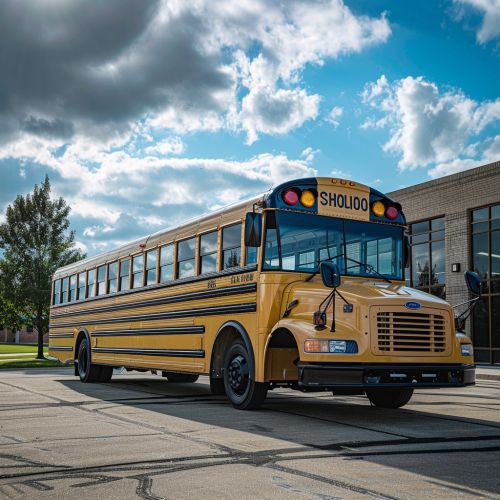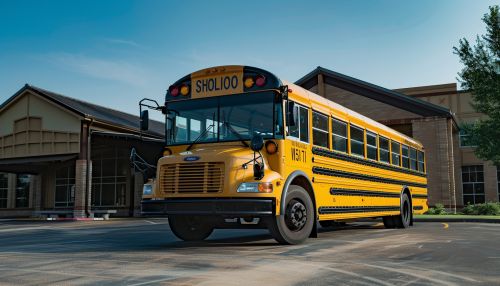Everson v. Board of Education: Difference between revisions
(Created page with "== Background == The case of '''Everson v. Board of Education''' (330 U.S. 1) is a landmark decision by the United States Supreme Court that was decided on February 10, 1947. The case dealt with the application of the Establishment Clause of the First Amendment to the states through the Due Process Clause of the Fourteenth Amendment to the United States Constitution|Fo...") |
No edit summary |
||
| Line 41: | Line 41: | ||
* [[Separation of church and state in the United States]] | * [[Separation of church and state in the United States]] | ||
[[Image:Detail-91729.jpg|thumb|center|Yellow school bus parked in front of a school building.|class=only_on_mobile]] | |||
[[Image:Detail-91730.jpg|thumb|center|Yellow school bus parked in front of a school building.|class=only_on_desktop]] | |||
== References == | == References == | ||
Latest revision as of 22:21, 19 June 2024
Background
The case of Everson v. Board of Education (330 U.S. 1) is a landmark decision by the United States Supreme Court that was decided on February 10, 1947. The case dealt with the application of the Establishment Clause of the First Amendment to the states through the Due Process Clause of the Fourteenth Amendment. The main issue in the case was whether a New Jersey statute that allowed reimbursements to parents for transportation costs to parochial schools violated the Establishment Clause.
Case History
Lower Courts
The case originated in Ewing Township, New Jersey, where a taxpayer, Arch Everson, challenged a local school board's decision to reimburse parents for transportation costs to both public and private schools, including parochial schools. Everson argued that this reimbursement constituted state support of religion, violating the Establishment Clause. The New Jersey courts upheld the statute, leading Everson to appeal to the U.S. Supreme Court.
Supreme Court
The Supreme Court granted certiorari to resolve the constitutional issue. The case was argued on November 20, 1946, and decided on February 10, 1947. The Court's opinion was delivered by Justice Hugo Black, with a 5-4 decision upholding the New Jersey statute.
Legal Issues
The primary legal question was whether the New Jersey statute violated the Establishment Clause of the First Amendment, which states, "Congress shall make no law respecting an establishment of religion." This clause was incorporated against the states through the Due Process Clause of the Fourteenth Amendment, making it applicable to state actions.
Majority Opinion
Justice Hugo Black wrote the majority opinion, which held that the New Jersey statute did not violate the Establishment Clause. The Court reasoned that the reimbursement was a general program to assist parents of all religions with getting their children to school. The funds were not paid directly to parochial schools but to parents, thus maintaining a separation between church and state. Black emphasized that the Establishment Clause meant neither a state nor the federal government could set up a church, pass laws aiding one religion, aid all religions, or prefer one religion over another.
Dissenting Opinions
Justices Rutledge, Murphy, Jackson, and Burton dissented. Justice Rutledge's dissent argued that the reimbursement program effectively supported religious education, which was contrary to the principles of the Establishment Clause. He contended that any aid to religious schools, even indirect, violated the constitutional mandate of separation of church and state.
Impact and Subsequent Developments
The decision in Everson v. Board of Education set a precedent for the interpretation of the Establishment Clause. It established the "wall of separation" doctrine, which has been used in numerous subsequent cases to evaluate the constitutionality of state actions involving religion. The case is often cited in discussions of state funding and religious institutions, influencing later decisions such as Lemon v. Kurtzman, which introduced the Lemon Test for determining violations of the Establishment Clause.
Criticisms and Controversies
The decision has been subject to extensive criticism and debate. Critics argue that the Court's reasoning was inconsistent, as it upheld a program that indirectly supported religious education while proclaiming a strict separation of church and state. Some legal scholars believe that the decision blurred the lines between permissible and impermissible state involvement with religion, leading to confusion in subsequent Establishment Clause jurisprudence.
See Also
- First Amendment to the United States Constitution
- Fourteenth Amendment to the United States Constitution
- Lemon v. Kurtzman
- Establishment Clause
- Separation of church and state in the United States


References
- Everson v. Board of Education, 330 U.S. 1 (1947).
